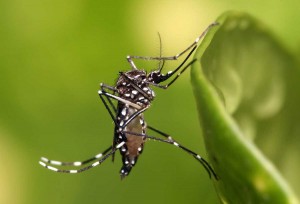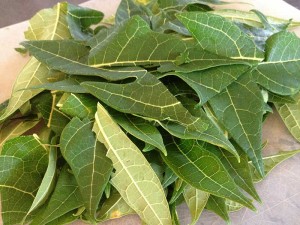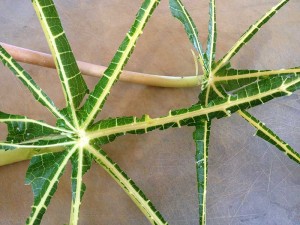¿Cura del dengue con hojas de papaya? / Dengue cure with papaya leaves?
Tomado de: http://ranchodelicioso.com/cura-de-dengue-con-hojas-papaya/
El dengue se ha extendido agresivamente en muchos lugares de Costa Rica durante la temporada de lluvia, especialmente en los pueblos y ciudades. Sin embargo, puede haber un remedio simple y de bajo costo que fue descubierto recientemente en India y que ha sido probado por doctores, expertos en medicina y todo aquel que se ha enterado al respecto. La cura es el jugo de las hojas de papaya comunes! Y la mejor parte aun, es que probablemente lo puedes fabricar en casa.
Aunque suena demasiado bueno para ser cierto, muchos estudios han mostrado resultados positivos y la información general sobre el tema, ha sido comprobada por el sitio de internet “Hoax Or Fact” (“Engaño o Realidad”, Hoax or Fact Website )
 El dengue es un virus transmitido por el mosquito Aedes, una especie que no es nativa de Costa Rica. Es una enfermedad que provoca un dolor similar al de la gripe y existe en muchas áreas tropicales habitadas por personas. El mosquito se mantiene activo durante el día y generalmente pica los tobillos. Según el Ministerio de Salud de Costa Rica, hubo 23,000 casos de dengue en el 2011 solamente. Hay cuatro cepas de dengue y cada día se puede desarrollar en una fiebre hemorrágica más seria, que requiere hospitalización y puede ser fatal. Algunos síntomas comunes incluyen: fiebre acompañada de dolor de cabeza, dolor muscular severo, dolor de articulaciones y sarpullido en el cuerpo. Hasta ahora no existe ningún medicamento o vacuna efectivos para luchar contra el dengue.
El dengue es un virus transmitido por el mosquito Aedes, una especie que no es nativa de Costa Rica. Es una enfermedad que provoca un dolor similar al de la gripe y existe en muchas áreas tropicales habitadas por personas. El mosquito se mantiene activo durante el día y generalmente pica los tobillos. Según el Ministerio de Salud de Costa Rica, hubo 23,000 casos de dengue en el 2011 solamente. Hay cuatro cepas de dengue y cada día se puede desarrollar en una fiebre hemorrágica más seria, que requiere hospitalización y puede ser fatal. Algunos síntomas comunes incluyen: fiebre acompañada de dolor de cabeza, dolor muscular severo, dolor de articulaciones y sarpullido en el cuerpo. Hasta ahora no existe ningún medicamento o vacuna efectivos para luchar contra el dengue.
Tradicionalmente, el jugo de hoja de papaya ha sido útil en el tratamiento de la fiebre provocada por el dengue. Algunos estudios recientes muestran el efecto del jugo de hoja de papaya para curar el dengue completamente. Un estudio reciente practicado a cinco pacientes de dengue por el Instituto de Manejo de Bosques de la India ha mostrado algunas observaciones muy interesantes.
En los cinco pacientes, el jugo de hoja de papaya fue efectivo en la cura del dengue. El número de plaquetas aumentó en los cinco pacientes que tomaron el jugo, en un periodo de 24 horas. Todos ellos reportaron una mejoría significativa en su estado de salud en ese periodo. Tal parece que este jugo verde y amargo resulta prometedor sin implicar ningún riesgo secundario serio. Como resultado, compañías farmacéuticas y nutracéuticas se encuentran preparando fórmulas de extractos de jugo de hoja de papaya.
De manera interesante, también se ha encontrado que la hoja de papaya tiene poderosas propiedades que ayudan a combatir la malaria y el cáncer. El extracto de hoja de papaya se ha utilizado en varios lugares del mundo como profiláctico para prevenir la malaria en regiones endémicas. De acuerdo a una investigación publicada en el Diario de Etnofamacología en el año 2010, doctores e investigadores de Estados Unidos y Japón han descubierto que las enzimas de la hoja de papaya tiene propiedades que ayudan en la lucha contra el cáncer y se sabe que son efectivas contra el cáncer de cérvix, mama, hígado, pulmón y páncreas. Según este estudio, no se le conocen efectos tóxicos a la hoja de papaya y su consumo no tiene efectos secundarios tampoco. Algunos doctores han comenzado a recomendar el té de hoja de papaya como parte de la quimioterapia.
Investigadores de Ayurveda han encontrado que las enzimas de la hoja de papaya pueden combatir una serie de infecciones virales, no solamente del dengue, y pueden ayudar a regenerar plaquetas y glóbulos blancos.
Estos estudios pueden no ser del todo sorprendentes, dado que un estudio hecho por la Universidad Purdue en Estados Unidos, mostraron que la hoja de papaya contiene más de los 50 ingredientes activos que sirven para matar hongos, gusanos, parásitos, bacterias y muchos tipos de células cancerígenas. Las hojas de papaya contienen nutrientes importantes que ayudan al sistema inmunológico, incluyendo las vitaminas A, C y E.
Estos son dos métodos de preparación recomendadas:
En ambos casos es necesario que la hoja de papaya esté CRUDA. No debes cocinarla ni hervirla! No prepares té con ella!
Método de Jugo:
Para la fiebre provocada por dengue, se sugiere que el jugo sea extraído al triturar hojas frescas de papaya. Se recomienda que la parte más verde de la hoja sea usada después de remover el tallo y cualquier otra parte más gruesa y fibrosa de la hoja. Esto se exprime o se machaca usando algún tipo de filtro de tela para extraer el jugo. Recuerde, el jugo debe prepararse con hojas de papaya frescas solamente. Una hoja de papaya provee una cucharada de jugo, aproximadamente; así que necesitará dos hojas para cada tratamiento. Dos cucharadas de jugo de hoja de papaya, tres veces al día es la dosis dada a los pacientes –una vez cada seis horas.
Método de Pasta:
Puede moler la parte verde y pulposa de la hoja hasta convertirla en una pasta. También puede usar una batidora o un procesador de comida. La pasta es amarga y probablemente prefiera mezclarla con jugo de frutas. Los doctores recomiendan de 20-25 ml (de cuatro a cinco cucharaditas aproximadamente), dos veces al día, en un periodo entre 3-7 días para obtener mejores resultados.
Recuperación
Muchos pacientes observan una recuperación casi total en un plazo de tres días, lo cual es extraordinario para un remedio natural si consideramos que, para infecciones bacteriales, los poderosos antibióticos necesitan más o menos el mismo periodo de tiempo para hacer su trabajo.
Recuerde, esto no es un sustituto del consejo médico pero es muy probable que su médico nunca haya escuchado sobre esto.
With the number of people catching dengue fever seemingly on the rise every year in Costa Rica, especially during this rainy season, the demand for a simple and inexpensive remedy has never been higher, and as with so many common ailments, the modern medical system is not very helpful. The good news is that researchers in India have managed to discover a good remedy for dengue based on an old folk cure. It is the common papaya leaf. Since they’ve discovered this, many people from India have managed to successfully and quickly cure dengue without spending a fortune on hospital visits. The best news of all is that you can easily make it at home.
Sounds too good to be true? Well, plenty of studies have showed positive results. Moreover, the well-respected HoaxorFact.com website that analyzes the truth behind the wild claims we often see on the internet, has confirmed that this cure is legit: (Hoax or Fact article on Papaya Leaf Dengue Cure)
What is Dengue
 Dengue is a virus transmitted by the Aedes-type mosquito, a species not native to Costa Rica. It’s a painful flu-type disease that exists in many tropical towns and cities where there are lots of people who create habitat for it such as old tires, coconut husks, blocked gutters, plastic tarps, and anything else that can form small pools of water. This mosquito is active during the day, and often bites at the ankles while the victim is sitting at a table with his or her legs in the shadows. According to Costa Rica’s Ministry of Health, there were 23,000 cases in 2011 in this country, and the World Health Organization says there are 100 million cases every year worldwide.
Dengue is a virus transmitted by the Aedes-type mosquito, a species not native to Costa Rica. It’s a painful flu-type disease that exists in many tropical towns and cities where there are lots of people who create habitat for it such as old tires, coconut husks, blocked gutters, plastic tarps, and anything else that can form small pools of water. This mosquito is active during the day, and often bites at the ankles while the victim is sitting at a table with his or her legs in the shadows. According to Costa Rica’s Ministry of Health, there were 23,000 cases in 2011 in this country, and the World Health Organization says there are 100 million cases every year worldwide.
There are four strains of Dengue, and each can develop into the more serious Hemorrhagic Fever, which requires hospitalization and can be fatal. With each infection of a new strain of Dengue, a person is increasingly like to contract Hemorrhagic fever. After being bitten by an infected mosquito, it usually takes 5-7 days for the first symptoms to occur. Common symptoms include fever with headache, severe muscle pain, joint pain and rashes on the body. Until now, there has been no effective medicine or vaccine for dengue. Common painkillers such as aspirin and Ibuprofen can all have bad side effects for Dengue sufferers, so victims have little pain relief (Acetaminophen is okay however.) It’s also important to keep people who have been infected under a mosquito net so they don’t infect others, because once they have the disease, any mosquito that bites them can transfer the disease to others. This is perhaps the most important, and least understood part of the fight against Dengue.
Until now, the treatment for Dengue was simple been to wait it out, letting the body’s immune system do the job in two weeks or so while the patient suffers painfully, and needs to go to the hospital regularly to check the blood for signs of Hemmorhagic Fever.
Benefits of Papaya Leaf
At this time, the only known cure for Dengue is papaya leaf, which is still not well known to doctors or the public. The juice or pulp made from this plant has been found to be quite effective not only in fighting the symptoms of dengue fever, but also in curing it.
Specialists from the Indian Institute of Forest Management have recently conducted a thorough study on five patients. The outcome was pretty amazing. Within 24 hours from drinking the juice made of papaya leaves, all the subjects reported a significant improvement of their overall health, reduced side effects and increased comfort. On top of all, they didn’tt experienced any side effects.
After the study was conducted and the results were promoted in the pharmaceutical world and the internet, many companies have begun to formulate medicines made from papaya leaf extract. They have realized that papaya leaf is not only helpful in fighting dengue, but also possess some extraordinary anti-cancer and anti-malarial properties. According to a 2010 research from the reputable Journal of Ethnopharmacology, many enzymes found in papaya leaves are known for their anti-cancer properties, fighting breast, liver, cervix, pancreatic and lung cancer. These studies showcase the properties of papaya leaf and outline that it does not have any toxic effects on the body. Some doctors have moved even further, beginning to recommend papaya leaf as an integral part of chemotherapy treatments.
Another amazing benefit of papaya leaves is that they can fight other viral infection such as the common cold virus. These amazing natural ingredients have been found to regenerate white blood cells and platelets. Not only that, but they contain over 50 ingredients that support the immune system, including important Vitamins such as A, C and E.
Two Case Studies
-
- I would like to share with everyone this discovery from a friend’s son who just recovered from dengue.
He was in the hospital and his blood platelet count had dropped to 15,000 [normally should be 150-400,000], after 15 liters of blood transfusions, and was still in a critical state.
His father became so worried that he sought recommendations from various friends, and the advice he received saved his son. He told me that in desperation he had given him raw juice from papaya leaves. Within a day his platelet count had jumped up to 135,000, surprising his doctors and nurses, and he was discharged from hospital. He asked me to pass this good news around. This is the cure used:
“It is raw papaya leaves, 2 pcs just cleaned, pounded and squeezed with a filter cloth. You will only get one tablespoon per leaf. So two tablespoon per serving once a day. Do not boil or cook or rinse with hot water, it will loose its strength. Only the leafy part and no stem or sap. It is very bitter and you have to swallow it. But it works.”
- One of my friends, who was 32 years old, had dengue fever last year. She was in a serious condition with a platelet count down to 28,000 after three days in hospital. Water had started to fill her lungs and she was having a hard time breathing. Her doctor told her that there was no cure for dengue and we just had to wait for her immune system to build resistance to the virus and fight the battle on its own. She had two blood transfusions already and all of us were praying hard for her. But despite this, her platelet count continue to drop.
Fortunately, her mother-in-law heard that papaya juice would help with her fever, so she found some papaya leaves and squeezed the juice out. Within a day, her platelet count started to increase and her fever came down. We continued to give her the papaya and she recovered within 3 days. Amazing, but it’s true.
Shared by Dr.B.N.Viswanath, consultant in organic farming & Organic Terrace Gardens
Bangalore, India Ph: 9845627217
Case Study 1:
Case Study 2:
How to Prepare Papaya Leaf Juice at Home
For both of these methods, it’s very important to remember that papaya leaf has to be RAW, which means no boiling, nor cooking. Both methods have been reported to work well, but the leaves must be fresh, and do not make tea out of them.
- 1. The Juice Method. For this method, it is recommended to extract the juice out of papaya leaves by crushing. After removing the stems and other fibrous parts you should crush the other part, the greener one. You can use a cloth filter or any other type of device to squeeze the juice out. However, remember that the leaves have to be fresh. If you don’t use raw fresh papaya leaves, the outcome might not be that good and the positive effect will be minimized. You need about two leaves for each treatment. Take two tablespoons of juice every six hours, three times a day and you will certainly feel better.
2. The Paste Method. You can use a food processor or a grinder to turn the leaves into a paste. However, because it is quite bitter, it is recommended to mix it with some fresh juice. Take four teaspoons twice a day. After three days to one week, you will see the difference.
Author’s Note: I put one large and one small papaya leaf into my Omega vertically-oriented auger-style juicer, and out came about 1 1/4 tablespoons of juice, which I stupidly decided to drink pure to see just how bitter it was. I can tell you it is extremely, painfully bitter, and no amount of juice taken after-the-fact seems to be helping me now. I highly recommend that readers mix it with a good amount of sweet juice and not try to drink it straight unless you want to suffer.
Expected Results
Most patients who suffer of dengue see sign of improvement within 24 hours of starting the papaya leaf treatment, and many are totally cured within three days. Almost everyone recovers within a week, while patients that simply wait it out take two weeks or more to heal, while suffering far greater pain and discomfort.
It’s also important to understand that this dengue “cure” is not yet accepted as scientifically proven in most countries. The CDC, Mayo Clinic, etc in the United States are still reporting that there is no cure for Dengue Fever. So, if you do contract it, be sure to go to your doctor so you can have your blood checked for hemorrhagic fever, and take papaya leaf on your own. Although the papaya leaf cure has apparently worked for some, there’s not guarantee that it works for everyone, since there’s so much variation in body chemistry from person to person, and the papaya leaf method is not thought to attack the Dengue virus directly, but instead to boost your immune response to it.
Referencias:
http://www.hoaxorfact.com/Health/papaya-leaf-juice-will-cure-dengue-fever-facts-analysis.html
http://articles.timesofindia.indiatimes.com/2012-09-12/kolkata/33788187_1_platelet-dengue-patients-papaya
http://www.indianexpress.com/news/papaya-leaf-juice-helps-fight-dengue-fever/1022585/
https://en.wikipedia.org/wiki/Dengue_fever
http://link.springer.com/article/10.1007%2Fs00508-009-1229-0
http://www.ncbi.nlm.nih.gov/pmc/articles/PMC3614241/


0 comentarios